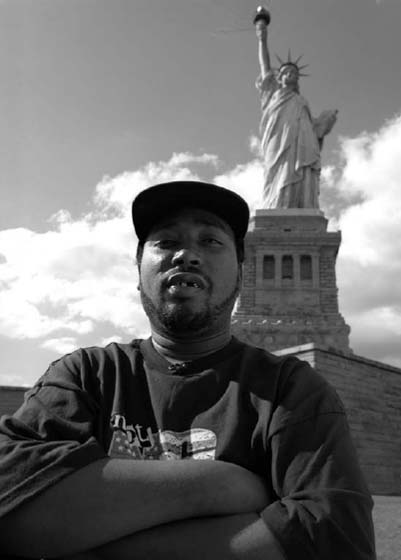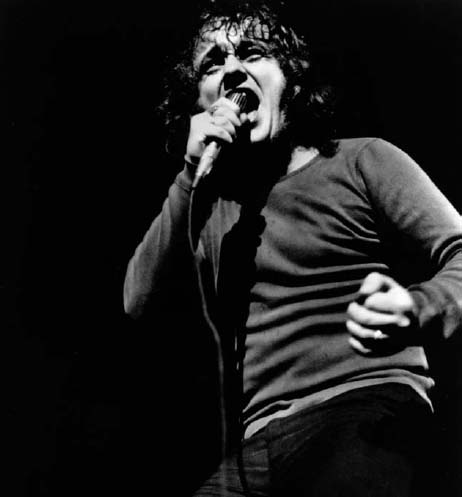The Encyclopedia of Dead Rock Stars (273 page)
Read The Encyclopedia of Dead Rock Stars Online
Authors: Jeremy Simmonds

Close!
Slade the Leveller
(New Model Army)
His band always a decent-sized draw in Europe, New Model Army frontman Justin ‘Slade the Leveller’ Sullivan nonetheless received a little more than he’d bargained for in June 1992. In front of a fervent crowd in Switzerland, Sullivan was felled by an enormous electric shock which left him clinically dead for three minutes. However - perhaps responding to a Cromwellian ‘dedication to task’ - the frontman made a full recovery, to continue preaching the Bradford band’s impassioned message.

Ol’ Dirty Bastard - with just about the only Liberty he didn’t take
Just two days short of his thirty-sixth birthday, Ol’ Dirty Bastard had been working on his comeback project at Wu-Tang’s New York studios on West 44th Street when he collapsed in the lounge. The artist, who had complained of breathing problems and chest pains during the afternoon, was pronounced dead at just after 5 pm: within minutes the studio was teeming with inconsolable Wu-Tang fans. As there was no history of heart problems in the Jones family, paramedics were baffled, and it was to take another month before the cause of death was revealed. Traces of the painkiller Tramadol and cocaine (plus a sealed wrap of the drug) had been found in ODB’s stomach, the lethal combination causing his system to shut down completely. Cause of death was thus ruled an accidental overdose. Five days later, the deceased artist (who also had his own computer games and clothing range) was eulogized by fans and fellow artists alike at his funeral in Brooklyn.
Friday 19
Terry Melcher
(Terry Jorden - New York, 8 February 1942)
Bruce & Terry/The Rip Chords

The son of actress Doris Day and her first husband, trombonist Al Jorden, Terry Melcher went on to become a major entertainment figure in his own right, shaping the sound of Californian pop during the sixties and early seventies. Melcher, who barely knew his father, was brought up by Day’s mother before being adopted by the actress’s third husband (though neither could tolerate the other). Already a producer at Columbia, Melcher – under the name Terry Day – formed the duo Bruce & Terry with future Beach Boy Bruce Johnston, the pair scoring a Top Five hit with ‘Hey Little Cobra’ (1964) as The Rip Chords. Melcher’s main work, however, was to oversee the output of The Byrds (for whom he produced 1965 chart-toppers ‘Mr Tambourine Man’ and ‘Turn! Turn! Turn!’) and Paul Revere & The Raiders.
A name familiar to many on the California scene was that of Charles Manson. By deigning to turn down the would-be singer and writer at his audition, Melcher had transgressed an unwritten law. The producer and his girlfriend – actress Candice Bergen – had been living at 10050 Cielo Drive, Los Angeles, when they decided to move on. Just months later, the home was the venue for one of the era’s most shocking crimes, new owner Sharon Tate being one of five (six, if you include her unborn baby) victims of a brutal killing by Manson and his followers. At the trial, it had been widely reported that Melcher was the intended victim: Manson denied this, chillingly stating that he knew the musician’s current address – but suggesting that his intention had been to ‘send Melcher a message’.
Melcher recovered from this sobering experience but his future in music was less secure, though he was to act as executive producer for four years on his mother’s television series. Melcher continued to make records, with Gram Parsons and Ry Cooder – and a couple on his own – though his biggest latterday success was probably as co-writer of The Beach Boys’ chart-topper ‘Kokomo’ (1988). The musician had been battling melanoma for some years by the time of his death in 2004.
DECEMBER
Thursday 2
Kevin Coyne
(Derbyshire, 27 January 1944)
(Siren)

Although championed by John Peel, singer/songwriter Kevin Coyne had a quiet career with only occasional bursts into the spotlight – this despite a remarkable output of some thirty-five albums. Coyne’s idiosyncratic lyrics of pain and human fallibility were largely based on his experi-
ences as a London-based therapist working with the mentally ill, a job he’d held down while recording two albums for Peel’s Dandelion label with guitarist Dave Clague under the group name Siren. Poor commercial response then obliged Coyne to look for other outlets; bizarrely, he was in the frame as The Doors sought a new singer after the death of Jim Morrison ( July 1971).
July 1971).
How that might have panned out is certainly fodder for the imagination.
Instead, Coyne settled for a series of variable solo albums with a number of different labels. The best was
Marjory Razprblade
(1973), his first effort for Virgin (Richard Branson was, apparently, a huge fan), sadly swamped by Mike Oldfield’s simultaneously issued
Tubular Bells.
Broad-minded and keen to absorb all forms of music, Coyne was to work with a number of distinguished names over the years, including Andy Summers (later of The Police), Zoot Money, The Ruts, Robert Wyatt and ex-Slapp Happy singer Dagmar Krause. But success continued to elude him and, following a stint with Cherry Red, Coyne relocated to Germany in 1985. Here, he was far better accepted, and not just as a musician: previous problems with alcoholism and depression were kicked into touch as Coyne exhibited paintings, took on acting roles and published two books of short stories. Having issued several new records (his two sons now featuring as musicians), Kevin Coyne was believed to have been at his most contented in 2004 – which makes his death from fibrosis of the lung somehow all the sadder. The story has it that Coyne spent his last few months lugging an oxygen tank around Europe with him while on tour, his final performance in Vienna taking place on the night of his death.
‘When people are in the turmoil of breakdown, they become more direct.’
Kevin Coyne

One side of the Coyne
Wednesday 8
‘Dimebag’ Darrell Abbott
(Dallas, Texas, 20 August 1966)
Pantera
DamagePlan

They called it the ‘day the metal died’. A rock night that wouldn’t normally have seen any greater carnage than the usual mosh-pit bruising accelerated into an onstage holocaust that shouldn’t have been possible. In the middle of the mayhem was former Pantera guitarist ‘Dimebag’ Darrell Abbott, the target of the first and only onstage assassination to be recorded in this book.
The son of country musician and songwriter Jerry Abbott, the young guitarist found himself banned from virtually all Texas contests simply for winning too often. His fretboard skills led to the originally monikered ‘Diamond’ Darrell Abbott and his drummer brother Vinnie Paul joining the fledgling Pantera when the guitarist was only seventeen. A band of Black Sabbath fans that developed to encompass both thrash and power metal, Pantera (the name derives from the members’ home town of Pantego as well as being Portuguese for ‘panther’) were musically far more adept than many of their peers, the line-up of Abbott, Abbott and Rex ‘Rocker’ Brown (bass) getting into their stride when vocalist Phil Anselmo replaced Terry Glaze in 1988. The band were always full on, angry and challenging, peaking with fearsome albums
Vulgar Display of Power
(1992) and
Far Beyond Driven
(1994, a US chart-topper). Some critics contended that Pantera at their best were one of the finest metal acts ever. (Those who didn’t rate the band suggested that their sound was derivative of the more established Metallica or perhaps obscurer Louisiana groove-metal merchants Exhorder.) Something of a hero among air guitarists, Abbott also found time for the more sedate pastime of writing a monthly column for
Guitar World.